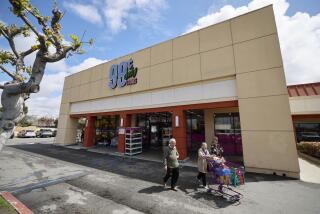Store’s Closure a Blow to USC Neighborhood
Selling lettuce for 33 cents a head and hiring neighborhood youths turned down for jobs elsewhere, the 32nd Street Market just north of USC has softened some of the hard edges in the densely populated community for half a century.
Generations of hungry but cash-strapped students knew they could wangle IOUs. Senior citizens flummoxed by impersonal big-box stores or chain supermarkets found the staff’s old-fashioned gabbiness uplifting. And residents of the burgeoning ethnic communities around the store snapped up the fresh, otherwise elusive ingredients they were seeking.
As a result, many people considered it the steadily beating heart of the neighborhood. Now that heart will be stilled.
“Stores like this, you don’t see them anymore,” said 85-year-old Larry Nash, a customer for 50 years who came for a final shopping spree this week as its longtime owner Morrie Notrica prepared to close the doors permanently at 9 tonight. “A lot of people are going to miss it. It had the best prices and the best variety around.”
The store has been a familiar fixture since 1951, when Notrica’s father, Joe, began selling meat, eggs and vegetables from a cramped shop across the street at 32nd and Hoover streets. Over the years, it moved twice and expanded to a 50,000-square-foot business that rivaled today’s typical chain-store supermarket in size but with the small-town appeal of a general store. Customers could rent a carpet cleaner, wire money abroad, send and receive faxes, have film developed, cash a check and pick up tamales in the deli.
The store is closing because negotiations with USC, which owns the shopping center where the store is located, ended recently without an extension of Notrica’s lease.
Neither Notrica nor USC is divulging why negotiations failed.
Carolyn Webb de Macias, a campus vice president, said in a written statement that USC is sorry to see Notrica go but “we cannot go into detail as to the reasons for the market’s closure.”
As he roved the beige linoleum floor of his fast-shrinking realm and greeted well-wishers, Notrica, 76, said he feels he’s being forced out but decided against a bruising legal challenge. “I’ve had a good ride, believe me,” he said.
As word spread this month that Notrica was selling his wares to the bare walls, longtime patrons like Greg Brush, 58, worried about the potential economic blow to the surrounding multiethnic area, which includes thousands of students as well as many families struggling to make ends meet.
“There’s no way a chain supermarket will advance you money or cash your check like Morrie does,” said Brush, a computer installer from South Los Angeles who forgoes the corporate-owned supermarket near his home where he said prices are higher.
This week, die-hard bargain hunters were slowing their pace, unsure whether they really had a taste for imitation crabmeat at $1.99 a pound or 12-quart tubs of strawberry ice cream for $5.99
Longtime patrons talked as though a loved one had met an untimely death. “I thought it would be there forever, just like USC,” said 83-year-old Arnold Simpson, a customer for 30 years. “It’s like losing a very dear friend.”
Seventy people will lose their jobs as a result of the store’s closure, manager Ed Oliver said.
The market put money in the pockets -- and often responsibility into the heads -- of local youths, many say.
“It helped buy my jacket when I earned my letter for football and track in high school,” said Jay Morales, a retired banker and downtown resident who worked as a box boy in the late 1950s and remained a loyal shopper.
“It was your first big opportunity. I see it in some of the street kids Morrie hired. Ralphs wouldn’t hire them. He has a talk with them. He tells them this is your store and you have got to protect it. And nobody steals.”
Notrica’s reputation for aiding people has helped him through some tight spots in return. His store remained untouched by widespread looting during the 1965 Watts riots and again during the 1992 riots. Both times, “everyone around us went down,” the grocer said.
During the 1992 unrest, three African American ministers stood guard over the store. “They said, ‘Leave this one alone,’ ” Notrica gratefully recalled.
A short, compact man with a barrel chest and a faint air of grumpiness, Notrica has worked 12-hour days, seven days a week, for as long as he can remember.
By the time he took over the store when his father died in 1963, he had learned two important principles that he never forgot. First, give people a reason to come to the store and they’ll come back. Second, buy at the right time and move goods at the lowest possible price.
And so was born a longtime motto of the 32nd Street Market: Home of the 19-cent head of lettuce. The price remained unchanged until about 10 years ago, even as it soared past $1 in other stores. The “new” price, 33 cents, lasted through this week.
It was a gimmick, but it worked. People would buy tomatoes, bell peppers, cucumbers and dressing to go with the lettuce. As long as they were there, they would pick up some baby food, canned peaches and taco sauce. “They were getting good bargains on that stuff too,” Notrica said, “so they were happy and I was happy.”
In a business that depends on high volume to make up for an industrywide profit margin of only 1% or 2%, he moved mountains of goods. Until a few years ago, the store was open 24 hours a day and had 16 checkout lanes.
For 18 years, Notrica has been chairman of the Los Angeles-based Mexican American Grocers Assn., an 8,000-member trade group spanning the U.S., Mexico and Puerto Rico.
The group’s president, Steven Soto, said Notrica’s reputation reaches far in the food and beverage industry.
“You can go to the headquarters of practically any big brand name in the country -- Coke, Pepsi, Procter & Gamble -- and they know Morrie Notrica,” he said.
Scott Hair, chairman of the California Independent Grocers Assn., remembers attending a trade show in Long Beach about five years ago. Market owners stood in lines around Notrica to “kiss his ring and get his advice,” he said. “It was amazing. It bordered on the religious.”
As shelves became bare in the store’s waning days, Notrica busied himself in his cramped upstairs office with packing up his files and removing dozens of appreciation plaques from the walls.
He won’t say what his plans are. “Retire? My mind’s still working,” he chuckled. “For me personally, one door closes and another one opens.”
More to Read
Inside the business of entertainment
The Wide Shot brings you news, analysis and insights on everything from streaming wars to production — and what it all means for the future.
You may occasionally receive promotional content from the Los Angeles Times.










